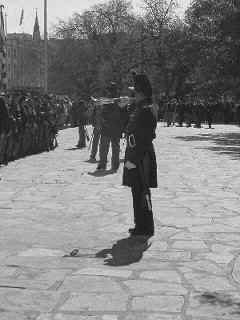 Some
Notes on Bugle Calls:
Some
Notes on Bugle Calls:
Reveille and Morning Camp Routine or,
Listening
to the Camp Clock
by: Chief Bugler J. Mogan
Many of you may think that the first bugle call of the day in an infantry
camp was the call we know as "Reveille." It is one of the most
recognizable of calls and dates, as do many of the bugle calls and
signals of the Civil War, from those first sounded in the bivouacs of
Napoleonís Grande Armee. However, for those of you who thought that,
please guess again.
The first bugle call in the infantry camp was just that: "First
Call," otherwise known as "Assembly of Buglers." Before
the rest of the camp was aroused to duty, the Adjutant would instruct
the Chief or Orderly Bugler to assemble the rest of the battalionís
buglers and musicians to headquarters to disseminate that dayís camp
call schedule to the buglers. This call would have been sounded earlier
at Brigade and Division Headquarters to have the respective subordinate
command chief buglers receive the higher headquarters call schedule. At
this time, an Orderly Bugler of the day might also be detailed. After
instructions were given, the company buglers and musicians would return
to their respective company streets to report to First Sergeant and give
him the schedule. By this time, of course, the men are already aroused.
It is time for the First Sergeant to have the men fall in and take the
roll. It is then that "Reveille" is sounded; it is the signal
for the men to fall in without arms or accoutrements so that the First
Sergeant can take the roll and complete his morning report.
After the completion of roll call, the camp would become a bustle of
activity with a number of calls being sounded. First, of course, would
be "Breakfast," then a number of other calls normally heard in
the morning: First Sergeants would be summoned to the Adjutant to bring
their morning report by "First Sergeantís (or Orderly Sergeantís)
Call; "Sick Call" would be sounded for men who reported sick
at roll call to fall in at the Surgeonís Tent (good luck, lads!); work
details would be summoned by "Fatigue (or Pioneerís) Call;"
officers might be summoned to report to the battalion command (or
battalion commander summoned to brigade) by "Officerís
Call." All of these calls would be heard, along with the
accompanying activity, prior to anyone falling into the company street
with musket and accoutrements. Finally, as we approach time for company
drill, "Recall" may be sounded to bring in fatigue details.
Shortly before company drill, the notes of "Drill Call" would
be heard, the signal for men to prepare for drill. Then, the notes of
"Assembly" would be heard as the call to fall in for company
drill.
As you can see, the sound of the bugleís notes are acting in camp
as the chimes of a clock, telling soldiers what is to be done and when.
And one whose noise never seems to stop resonating throughout the
morning. The bugle was not only a vital means of communication for
command and control on the line of battle, it was the voice of command
within the campÖthe camp clock.